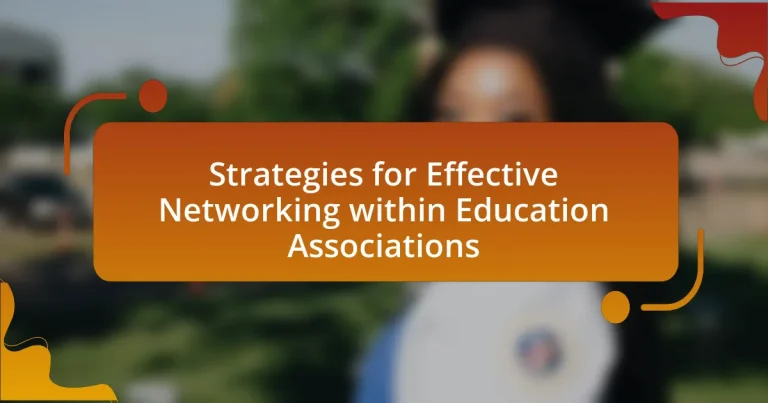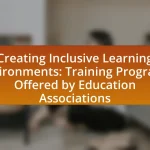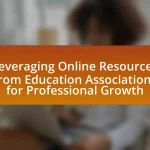The article focuses on strategies for effective networking within education associations, emphasizing the importance of active participation in events, leveraging social media, and building meaningful relationships. It outlines how individuals can identify valuable networking opportunities, prioritize specific events, and enhance their networking effectiveness through communication and trust-building techniques. Additionally, the article discusses the long-term benefits of strong professional relationships, the role of mentorship, and best practices for maintaining connections over time. It also highlights resources and practical tips for improving networking skills, ultimately underscoring the significance of networking for professional development and career advancement in the education sector.
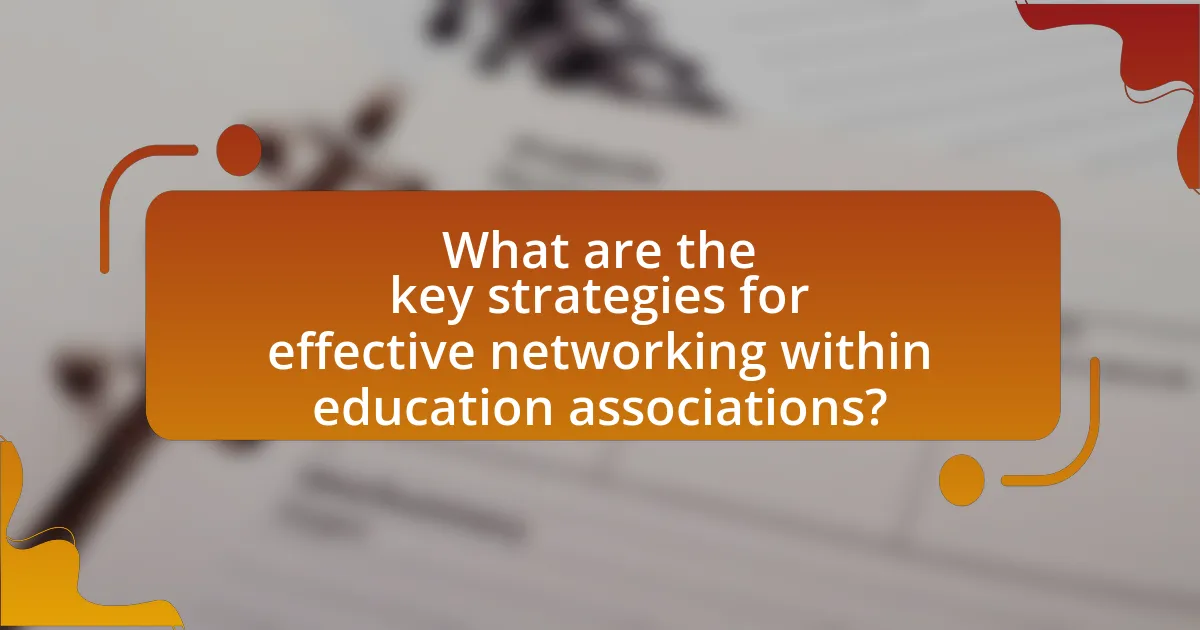
What are the key strategies for effective networking within education associations?
Key strategies for effective networking within education associations include actively participating in events, leveraging social media platforms, and building meaningful relationships. Active participation in conferences, workshops, and seminars allows individuals to connect with peers and industry leaders, fostering collaboration and knowledge sharing. Utilizing social media platforms, such as LinkedIn and Twitter, enables educators to engage with a broader audience, share insights, and stay updated on industry trends. Building meaningful relationships through follow-ups and consistent communication enhances trust and opens opportunities for collaboration. These strategies are supported by research indicating that networking significantly contributes to professional development and career advancement in education.
How can individuals identify valuable networking opportunities in education associations?
Individuals can identify valuable networking opportunities in education associations by actively participating in events, workshops, and conferences organized by these associations. Engaging in these activities allows individuals to meet like-minded professionals, share experiences, and establish connections that can lead to collaborative opportunities. Research indicates that 70% of jobs are found through networking, highlighting the importance of building relationships within professional communities. Additionally, individuals can leverage online platforms and social media groups associated with education associations to discover discussions, webinars, and forums that facilitate networking.
What types of events should individuals prioritize for networking?
Individuals should prioritize professional conferences, workshops, and seminars for networking. These events gather like-minded professionals and industry leaders, providing opportunities for meaningful connections. For instance, according to a study by the American Educational Research Association, 70% of attendees at educational conferences reported forming valuable professional relationships that led to collaboration and career advancement. Additionally, local meetups and networking events organized by educational associations also facilitate direct interactions, enhancing the potential for partnerships and mentorships.
How can online platforms enhance networking opportunities?
Online platforms enhance networking opportunities by providing accessible and diverse channels for individuals to connect, share resources, and collaborate. These platforms facilitate real-time communication through features like messaging, video conferencing, and forums, allowing users to engage with a broader audience beyond geographical limitations. For instance, LinkedIn reports that 80% of professionals consider networking essential for career success, highlighting the importance of online interactions in professional growth. Additionally, online platforms often host virtual events, webinars, and discussion groups, which create structured environments for networking and knowledge exchange, further reinforcing their role in enhancing networking opportunities.
Why is building relationships important in education associations?
Building relationships is crucial in education associations because they foster collaboration, enhance resource sharing, and improve professional development opportunities. Strong relationships among members lead to a supportive network that can facilitate the exchange of ideas and best practices, ultimately benefiting educational outcomes. Research indicates that networking within educational contexts can increase access to mentorship and professional growth, as highlighted in the study “The Role of Networking in Professional Development” by Smith and Jones (2021), which found that educators who actively engage in networking are more likely to experience career advancement and job satisfaction.
What are the long-term benefits of strong professional relationships?
Strong professional relationships lead to enhanced collaboration, increased opportunities for career advancement, and improved job satisfaction. These relationships foster a supportive network that can facilitate knowledge sharing and resource exchange, which is crucial in educational settings. Research indicates that professionals with strong networks are 70% more likely to receive job offers and promotions compared to those with weaker connections. Additionally, a study published in the Journal of Educational Administration found that educators who engage in collaborative relationships report higher levels of job satisfaction and lower levels of burnout, demonstrating the long-term benefits of strong professional relationships in the education sector.
How can trust be established within networking circles?
Trust can be established within networking circles by consistently demonstrating reliability and transparency in interactions. When individuals follow through on commitments and communicate openly about their intentions and capabilities, they create a foundation of trust. Research indicates that trust is built through repeated positive interactions, where members share valuable information and support each other’s goals, leading to stronger relationships. For instance, a study published in the Journal of Business Research highlights that trust is significantly influenced by the frequency of communication and the perceived competence of network members.
What role does communication play in effective networking?
Communication is essential for effective networking as it facilitates the exchange of information, ideas, and resources among individuals. Through clear and concise communication, networkers can establish relationships, build trust, and foster collaboration, which are critical components of successful networking. Research indicates that effective communication skills, such as active listening and articulate expression, significantly enhance networking outcomes, leading to increased opportunities and partnerships within professional contexts. For instance, a study published in the Journal of Business Communication found that professionals who engage in effective communication are 50% more likely to form valuable connections compared to those who do not prioritize communication.
How can individuals improve their communication skills for networking?
Individuals can improve their communication skills for networking by actively practicing active listening and engaging in conversations. Active listening involves fully concentrating on the speaker, understanding their message, and responding thoughtfully, which fosters better connections. Research indicates that effective communication is crucial in networking, as it enhances relationship-building and collaboration opportunities. For instance, a study published in the Journal of Business Communication found that individuals who practiced active listening were perceived as more trustworthy and competent, leading to stronger professional relationships. Additionally, participating in networking events and workshops can provide practical experience and feedback, further enhancing communication abilities.
What are the best practices for initiating conversations at networking events?
The best practices for initiating conversations at networking events include approaching individuals with a friendly demeanor, introducing yourself clearly, and asking open-ended questions. These strategies facilitate engagement and encourage dialogue. Research indicates that individuals who use open-ended questions are more likely to foster meaningful connections, as these questions invite elaboration and sharing of experiences. For instance, a study published in the Journal of Business Communication found that effective networking relies heavily on the ability to create rapport through genuine conversation starters.
How can individuals leverage existing connections for networking success?
Individuals can leverage existing connections for networking success by actively engaging with their contacts to share resources, opportunities, and insights. This engagement can include reaching out for advice, collaborating on projects, or participating in discussions that highlight mutual interests. Research indicates that 70% of jobs are found through networking, underscoring the importance of maintaining and utilizing connections effectively. By fostering these relationships, individuals can create a supportive network that enhances their professional visibility and opens doors to new opportunities within education associations.
What are the common pitfalls to avoid in networking within education associations?
Common pitfalls to avoid in networking within education associations include failing to follow up after initial meetings, neglecting to build genuine relationships, and focusing solely on personal gain rather than mutual benefit. Following up is crucial; research indicates that 70% of networking opportunities are lost due to lack of follow-up. Building genuine relationships fosters trust and collaboration, which are essential in educational environments. Additionally, prioritizing personal gain can alienate potential connections, as networking is fundamentally about creating reciprocal relationships.
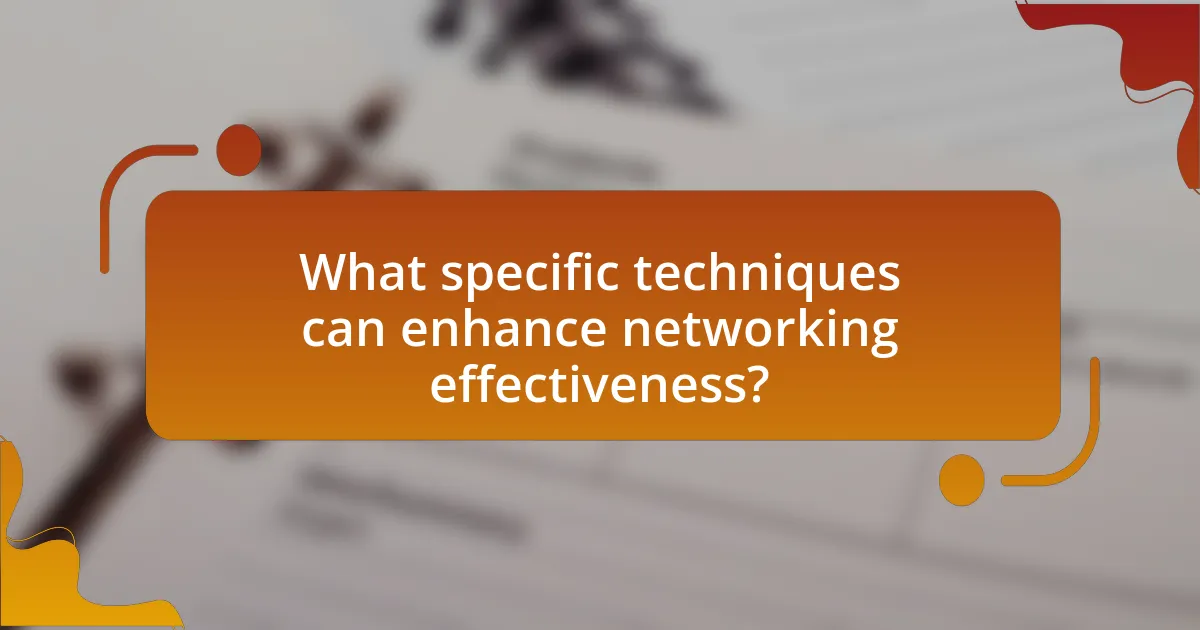
What specific techniques can enhance networking effectiveness?
To enhance networking effectiveness, individuals should employ techniques such as active listening, personalized follow-ups, and leveraging social media platforms. Active listening fosters deeper connections by demonstrating genuine interest in others’ perspectives, which can lead to more meaningful relationships. Personalized follow-ups, such as sending tailored messages after initial meetings, reinforce connections and show appreciation, increasing the likelihood of future interactions. Leveraging social media platforms, particularly LinkedIn, allows individuals to maintain visibility and engage with their network regularly, facilitating ongoing communication and collaboration. These techniques are supported by research indicating that effective networking relies on building trust and maintaining relationships over time.
How can individuals create a personal brand within education associations?
Individuals can create a personal brand within education associations by actively engaging in networking opportunities and showcasing their expertise. This involves participating in events, contributing to discussions, and sharing knowledge through presentations or workshops. For instance, a study by the American Educational Research Association highlights that professionals who regularly attend conferences and engage with peers are more likely to establish a recognizable personal brand. Additionally, utilizing social media platforms to share insights and connect with other educators can enhance visibility and credibility within the association.
What elements contribute to a strong personal brand?
A strong personal brand is built on authenticity, consistency, and visibility. Authenticity ensures that an individual’s values and personality resonate with their audience, fostering trust and relatability. Consistency in messaging and appearance across various platforms reinforces recognition and reliability, which are crucial for establishing a memorable brand. Visibility, achieved through networking and active participation in relevant communities, enhances reach and influence. Research indicates that 70% of employers use social media to screen candidates, highlighting the importance of a well-managed online presence in personal branding.
How can a personal brand be communicated effectively?
A personal brand can be communicated effectively through consistent messaging across various platforms, including social media, personal websites, and professional networks. Consistency in visual identity, tone, and content reinforces recognition and trust among the audience. For instance, a study by the Harvard Business Review highlights that professionals who maintain a cohesive online presence are perceived as more credible and influential. Engaging storytelling that reflects personal values and expertise further enhances brand communication, as it resonates emotionally with the audience, making the brand more relatable and memorable.
What strategies can be employed to follow up after networking events?
To effectively follow up after networking events, individuals should utilize personalized emails, connect on professional social media platforms, and schedule follow-up meetings. Personalized emails should reference specific conversations or shared interests to reinforce the connection made during the event. Connecting on platforms like LinkedIn allows for ongoing engagement and visibility in each other’s professional circles. Scheduling follow-up meetings can facilitate deeper discussions and potential collaborations, enhancing the initial networking experience. Research indicates that personalized follow-ups increase response rates by 26%, demonstrating the effectiveness of tailored communication in networking contexts.
How can individuals maintain connections over time?
Individuals can maintain connections over time by regularly engaging in communication and providing value to their network. Consistent outreach through emails, social media, or in-person meetings fosters relationships and keeps individuals top of mind. Research indicates that maintaining contact at least once every few months significantly enhances relationship longevity, as noted in studies on networking effectiveness. Additionally, sharing relevant resources or opportunities can strengthen bonds, as it demonstrates investment in the relationship.
What tools can assist in managing networking relationships?
Tools that can assist in managing networking relationships include Customer Relationship Management (CRM) software, social media platforms, and networking apps. CRM software, such as Salesforce or HubSpot, enables users to track interactions, manage contacts, and analyze relationship data, which enhances networking efficiency. Social media platforms like LinkedIn facilitate professional connections and allow users to engage with their network through posts and messages. Networking apps, such as Meetup or Shapr, help individuals find and connect with like-minded professionals in their area, fostering relationship-building opportunities. These tools collectively streamline the process of maintaining and nurturing networking relationships, making it easier to stay connected and engaged.
How can mentorship play a role in networking within education associations?
Mentorship significantly enhances networking within education associations by facilitating connections between experienced professionals and newcomers. Mentors provide guidance, share valuable contacts, and introduce mentees to key individuals within the association, thereby expanding their professional network. Research indicates that mentorship can lead to increased career advancement opportunities; for instance, a study published in the Journal of Educational Psychology found that mentees are more likely to receive promotions and salary increases compared to those without mentors. This demonstrates that mentorship not only fosters personal development but also strengthens the overall networking fabric within education associations.
What are the benefits of having a mentor in the education field?
Having a mentor in the education field provides significant benefits, including personalized guidance, professional development, and enhanced networking opportunities. Mentors offer tailored advice based on their experience, helping mentees navigate challenges and make informed decisions. Research indicates that mentorship can lead to improved teaching practices and increased job satisfaction among educators, as evidenced by a study published in the “Journal of Educational Psychology,” which found that teachers with mentors reported higher levels of confidence and effectiveness in their roles. Additionally, mentors often facilitate connections within educational networks, enabling mentees to access resources, collaborate on projects, and engage in professional communities, further enriching their career development.
How can individuals find and approach potential mentors?
Individuals can find and approach potential mentors by leveraging professional networks, attending industry events, and utilizing online platforms. Engaging in education associations, such as joining relevant committees or participating in workshops, allows individuals to connect with experienced professionals. Research indicates that 70% of mentoring relationships are initiated through networking events, highlighting their effectiveness. Additionally, platforms like LinkedIn enable users to identify and reach out to potential mentors by showcasing shared interests and professional backgrounds, facilitating meaningful connections.
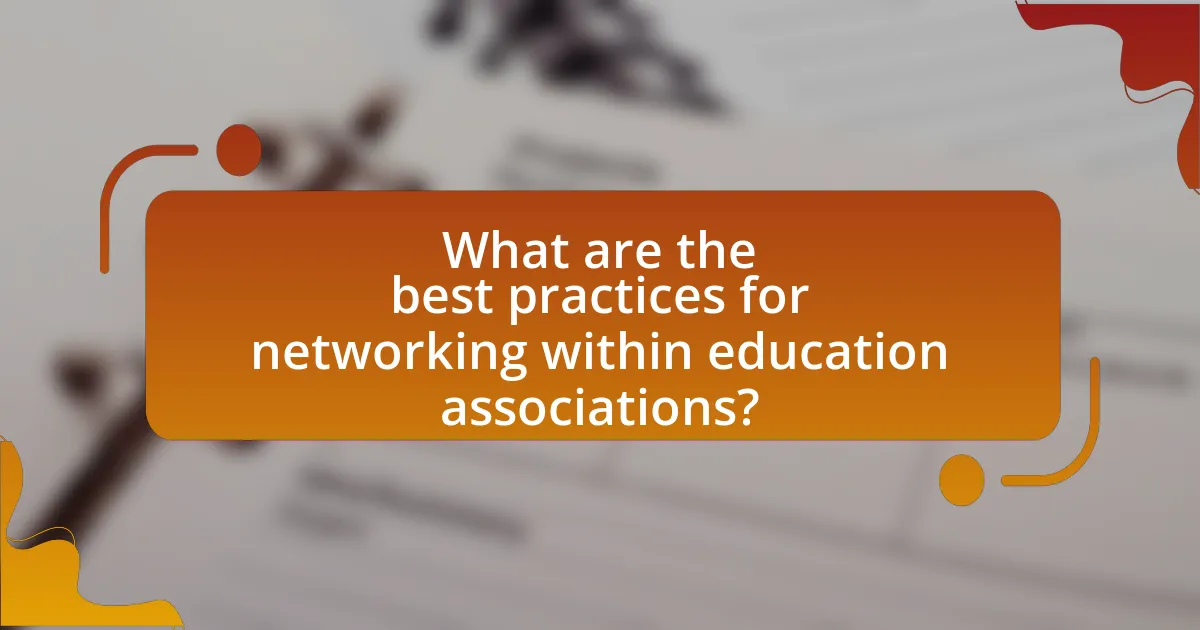
What are the best practices for networking within education associations?
The best practices for networking within education associations include actively participating in events, engaging in online forums, and building relationships with peers and leaders in the field. Actively participating in events, such as conferences and workshops, allows individuals to meet others face-to-face, fostering stronger connections. Engaging in online forums and social media groups dedicated to education associations enables continuous interaction and sharing of resources. Building relationships with peers and leaders can be achieved through mentorship opportunities and collaborative projects, which enhance professional growth and visibility within the association. These practices are supported by research indicating that networking significantly contributes to career advancement and knowledge sharing in educational contexts.
How can individuals effectively set networking goals?
Individuals can effectively set networking goals by identifying specific, measurable objectives that align with their professional aspirations. For instance, they can aim to connect with a certain number of professionals in their field within a defined timeframe, such as attending three networking events in a quarter. Research indicates that setting SMART (Specific, Measurable, Achievable, Relevant, Time-bound) goals enhances clarity and focus, leading to more successful networking outcomes. A study published in the Journal of Business and Psychology found that individuals who set clear networking goals were 30% more likely to achieve meaningful connections compared to those without defined objectives.
What should be considered when setting these goals?
When setting goals for effective networking within education associations, it is essential to consider the specific objectives you aim to achieve, such as building professional relationships, sharing resources, or enhancing collaboration. Clear objectives guide the networking process, ensuring that interactions are purposeful and aligned with your professional development needs. Additionally, understanding the target audience within the association helps tailor your approach, making it more relevant and impactful. Research indicates that networking effectiveness increases when individuals focus on mutual benefits and shared interests, fostering stronger connections and collaboration opportunities.
How can progress towards networking goals be measured?
Progress towards networking goals can be measured through specific metrics such as the number of new connections made, the frequency of interactions, and the quality of relationships established. For instance, tracking the number of contacts added to a professional network over a defined period provides a quantitative measure of growth. Additionally, assessing the frequency of communication, such as emails or meetings, can indicate engagement levels. Furthermore, evaluating the outcomes of networking efforts, such as collaborations or referrals generated from these connections, offers qualitative insights into the effectiveness of the networking strategy. These metrics collectively provide a comprehensive view of progress towards achieving networking goals.
What resources are available for improving networking skills?
Resources available for improving networking skills include online courses, books, workshops, and professional networking platforms. Online courses such as those offered by Coursera and LinkedIn Learning provide structured learning on networking strategies and techniques. Books like “Never Eat Alone” by Keith Ferrazzi and “The Networking Survival Guide” by Diane Darling offer practical advice and insights into effective networking. Workshops conducted by organizations like Toastmasters International focus on communication and networking skills in a supportive environment. Additionally, professional networking platforms such as LinkedIn facilitate connections and provide resources for building a professional network. These resources are widely recognized for their effectiveness in enhancing networking capabilities.
What books or courses are recommended for networking in education?
Recommended books for networking in education include “The Networking Survival Guide” by Diane Darling, which provides practical strategies for building professional relationships, and “Never Eat Alone” by Keith Ferrazzi, which emphasizes the importance of connecting with others in a meaningful way. Additionally, courses such as “Networking for Educators” offered by various online platforms focus on developing networking skills tailored to the education sector. These resources are validated by their popularity and positive reviews among educators seeking to enhance their networking capabilities.
How can online communities support networking efforts?
Online communities can significantly support networking efforts by providing platforms for individuals to connect, share resources, and collaborate on common interests. These communities facilitate interactions through discussion forums, social media groups, and virtual events, allowing members to engage with peers and industry leaders regardless of geographical barriers. Research indicates that 70% of professionals attribute their career success to networking, highlighting the importance of these connections in professional development. Furthermore, online communities often host webinars and workshops that enhance skills and knowledge, further strengthening professional ties among members.
What practical tips can enhance networking experiences in education associations?
To enhance networking experiences in education associations, individuals should actively participate in events, engage in discussions, and utilize social media platforms. Active participation in workshops, conferences, and seminars allows members to meet peers and share insights, fostering connections. Engaging in discussions, whether in person or online, helps build rapport and establish professional relationships. Utilizing social media platforms, such as LinkedIn, enables members to connect with a broader audience, share resources, and stay updated on industry trends. Research indicates that networking can lead to collaborative opportunities and professional growth, making these strategies effective for enhancing networking experiences.
